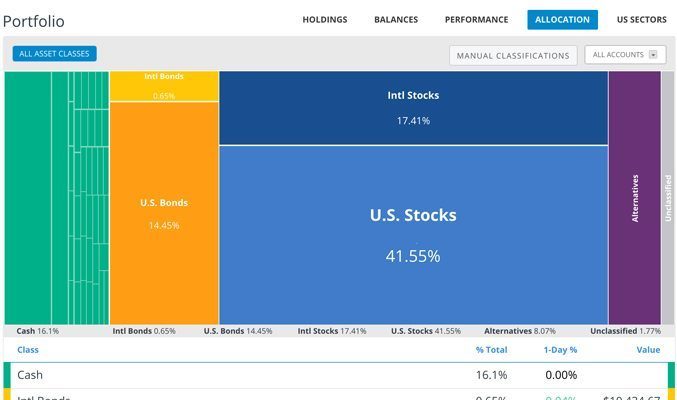One interesting component of Betterment is the Tax Coordinated Portfolio which automatically selects an assets location in a way that is optimized for taxes. Asset location can be important in increasing portfolio returns. For example, a high earner would generally prefer that dividends and short-term capital gains accrue in a tax-protected account where they will continue to grow tax-free rather than in a taxable account where the short-term gains will be counted as income for your current year and therefore subject to a high marginal tax rate.
I have no affiliate relationship with Betterment.
Personal Capital
Of all the roboadvisors, Personal Capital is the only one where I have personal experience (in part because they have some amazing FREE services). I have an affiliate relationship with them and will receive $100 for new accounts opened where you link accounts that total over $100K.
Why would you link your accounts to Personal Capital?
Because you’ll get pretty graphs and charts revealing information about your assets. As this isn’t meant to be a comprehensive review of any particular roboadvisor, I’ll just mention the feature I like the most: the asset allocation graph. Personal Capital has an x-ray feature where they look through your index funds to compose a true asset allocation. This is helpful because you see that by virtue of owning an index fund like Vanguard Total Stock Market, you have exposure to asset classes like real estate and alternatives (which might not be obvious to you at first).
Here’s an example of Personal Capital’s asset allocation. Again – this service is free – which makes it worth the time to open an account and link up your accounts.

When it comes to wealth management services, Personal Capital is more expensive than Wealthfront or Betterment. First, you’ll need at least $100,000 to qualify for their advisory services (the website is free no matter how much money you have). Next, you’ll pay anywhere from an annual 0.89% fee (on balances between $100K to $1M) to 0.49% (if you have over $10M). Human advisors aren’t cheap, so you’ll have to pay for their advice. In this way Personal Capital seems more akin to the traditional financial advisory service rather than a roboadvisor.
WiseBanyan
WiseBanyan has no account minimum and charges no management fees. Too good to be true? WiseBanyan’s model relies on bringing in investors under the “no fee” model and then upselling those investors to customized portfolio management services which may cost between 0.50% to 1.0%.
This means that if you want tax-loss harvesting, tax preparation, help implementing a backdoor Roth IRA, you’ll need to pay for those services. Additionally, they do have some fees from their broker-dealer that will be passed on to you (such as $75 to transfer outgoing accounts).
I have some concern that WiseBanyan’s no-cost model will be sustainable in the future. After all, the investment backers are looking to make a profit and you can’t make a profit without charging some type of fees. However, for a low account balance I suppose there could be some benefit in using WiseBanyan.
I have no affiliate relationship with WiseBanyan.
Acorns
Acorns is part of the world of “micro investing” that aims to get you to save and invest more money by finding ways to take money out of your bank account that you won’t miss. Acorns will round every purchase you make to the nearest dollar and invest the difference.
Over time, I could see this method effective in generating small account balances but probably isn’t effective for building real wealth. However, if you’re looking for a way to trick yourself into saving more, apps like Acorns might be the psychological trick you’ve been looking for.
Acorns charges a minimun fee of $1/month or 0.25% per year once your account is greater than $5,00 (or no fees if you are under 24 and sign up with a valid .edu email address).
The rounding up approach to investing feels pretty gimmicky and aimed at millennial college students. It’s also likely to generate a ton of tax documents for you since you’ll need to establish the cost basis for all of those tiny purchases you’ll be making through the year.
I have no affiliate agreement with Acorns.
Blooom
Yes, you read that correctly – there’s an extra “o” in their name (domains are hard to come by I guess!).
Blooom is an interesting product because it only manages your 401(k). In that sense, it’s really nice that you don’t have to set up a new account to work with them. On the flip side, I guess you’d need to hire an additional roboadvisor to work with your IRA and taxable accounts. However, if you only have a 401(k) for now I could see Blooom being a worthwhile product.
Blooom charges $10/month to optimize your 401(k) options, minimize fees, regular rebalancing and help you come up with the right investment allocation. In other words, you tell Blooom basic facts about yourself, such as current age and when you’d like to retire and Blooom goes to work finding the right portfolio based on the options in your 401(k). Since I get a lot of questions about what investments to pick inside the limited world of a 401(k), I could see this service being useful for some people.
I have no affiliate relationship with Blooom.
Future Advisor
Future Advisor is another standard roboadvisor with a slick interface. They’ve been around since 2010 and can manage all of your taxable and 401(k) accounts.
Their fees are 0.5% annually on assets under management, with a minimum account of $3,000. For that price, you could instead hire a professional manager, so it’s not clear why they’re charging that much for roboadvisory services. I think you’d be hard pressed to justify the fee given that you can get a similar service for less than half the fee by using a service like Wealthfront or Betterment.
I have no affiliate relationship with Future Advisor.
Vanguard
After seeing the rise of roboadvisors, the traditional investment companies were quick to recognize the trend and offer similar services. Given Vanguard’s traditionally low fees, rather than offering a complete roboadvisor service, Vanguard opted for providing live advisory services for a price similar to what you’d pay for a roboadvsior.
For a minimum investment of $50,000 and for a fee of 0.3% annually, you can get access to Vanguard’s financial planning services and advice from personal advisors. Vanguard obviously has a bias towards recommending its own funds but that bias is probably well deserved.
The real value here is that for only 0.05% more than Wealthfront or Betterment you can have access to live advisors, if that’s the sort of thing you’d find valuable (some people want to call up and speak to a human).
I have no affiliate relationship with Vanguard.
Charles Schwab
Schwab has been increasingly competitive with Vanguard over the past couple of years and this space is no different. If you’re willing to invest solely in Schwab ETFs, Schwab will provide its “Intelligent Portfolio” service for free, which includes a tax-loss harvesting service. You won’t get access to live advisors at this price but you do get some value added at no cost to yourself.
Schwab is an established company and so I imagine a lot of investors already have money with them. If you do, I can see this being a valuable service.
I have no affiliate relationship with Schwab.
Summary
Of all the services, I like the looks of Betterment the most (even with their recent fee increases). I’m also a fan of Personal Capital’s free account aggregation interface and think their free tools are worth the cost of signing up (a few minutes of your time, plus you’ll get a couple of friendly calls from their financial advisors, although I’ve never spoken with them).
As this market matures, it’s nice to see a broad range of services from the expensive live advisors to the completely free services. If you’re a solo financial advisor, there is increasing pressure to bring in additional skills to the advisor services, such as student loan management, asset protection, insurance knowledge and tax management expertise.
While most DIY investors will shun using a roboadvisor, for an investor that is looking for some guidance for a reasonable fee, you could do a lot worse than roboadvisors. I think opening a roboadvisor account when you’re getting started investing is a perfectly reasonable option.
If you approach your investing career as one of incremental learning, you’ll gain an understanding of several important concepts as long as you are regularly reviewing your roboadvisor accounts and make an effort to understand their recommendations.
